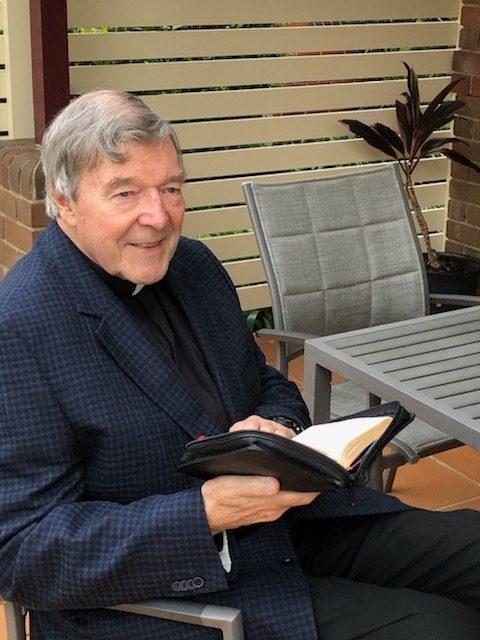Cardinal George Pell said Friday that suffering can be offered to God for good, and that Christians see Christ in the suffering, and are obliged to help them. His message came days after his release from prison, and amid the global coronavirus pandemic.
“The sexual abuse crisis damaged thousands of victims. From many points of view the crisis is also bad for the Catholic Church, but we have painfully cut out a moral cancer and this is good. So too some would see COVID-19 as a bad time for those who claim to believe in a good and rational God, the Supreme Love and Intelligence, the Creator of the universe,” Pell wrote in an Easter message published by The Australian April 10.
“It is a mystery; all suffering, but especially the massive number of deaths through plagues and wars. But Christians can cope with suffering better than the atheists can explain the beauty and happiness of life,” the cardinal added.
Pell was convicted in December 2018 of sexually assaulting two choirboys at the Melbourne Cathedral in 1996. On April 7, the Australian High Court unanimously ruled that the evidence presented during the trial would not have allowed the jury to avoid reasonable doubt and ordered Pell’s acquittal and release after more than 400 days in prison.
The High Court’s Tuesday decision marked the end of a nearly three-year legal process which began in June 2017, when the cardinal was charged with several counts of sexual assault dating back decades. The majority of these charges were dropped before they could be brought to trial.
Pell, who was most recently the Archbishop of Sydney before he left Australia in 2014 for a Vatican position as prefect of the Secretariat of the Economy, has returned to Sydney after his release from prison.
In his message, the cardinal acknowledged his incarceration, writing that “I have just spent 13 months in jail for a crime I didn’t commit, one disappointment after another. I knew God was with me, but I didn’t know what He was up to, although I realised He has left all of us free. But with every blow it was a consolation to know I could offer it to God for some good purpose like turning the mass of suffering into spiritual energy.”
“The only Son of God did not have an easy run and suffered more than his share. Jesus redeemed us and we can redeem our suffering by joining it to His and offering it to God,” Pell added.
In a reference to the challenges of the coronavirus pandemic, Pell noted that in times of plague and difficulty, Christians were unique in the ancient world for their commitment to nurse and care for the sick.
Pell cited Kiko Argüello, co-initiator of the Neocatechumenal Way, for having noted how “a fundamental difference between God-fearers and secularists today is found in the approach to suffering."
“Too often the irreligious want to eliminate the cause of the suffering, through abortion, euthanasia, or exclude it from sight, leaving our loved ones unvisited in nursing homes. Christians see Christ in everyone who suffers — victims, the sick, the elderly — and are obliged to help,” he wrote.
The 78-year-old’s release from prison this week has been controversial, and was met with protest in Australia.
Hours after Pell was exonerated, St. Patrick’s Cathedral in Melbourne was vandalized. The cathedral’s door was spray-painted with a cartoon image of a devil, along with the message “ROT IN HELL, PELL.” Other doors were daubed with upside-down crosses and the words “NO JUSTICE,” “PAEDO RAPIST,” and: “The law protects the powerful.”
Archbishop Peter Comensoli of Melbourne told Australian media that while he was upset about the vandalism, he was “not entirely surprised.”
“There remains such strong emotions around all of these matters,” Comensoli told Australian news network 3AW.
The cardinal’s Easter message included a proclamation of the Gospel: that Jesus of Nazareth died, and was resurrected bodily. “It was a return of his entire person from death, breaking the rules of health and physics, as Christians believe this young man was the only Son of God, divine, the Messiah...who redeems us, enables us to receive forgiveness and enter into a happy eternity.”
On April 7, the day he was released from prison, the cardinal told CNA that "prayer has been the great source of strength to me throughout these times, including the prayers of others, and I am incredibly grateful to all those people who have prayed for me and helped me during this really challenging time.”

